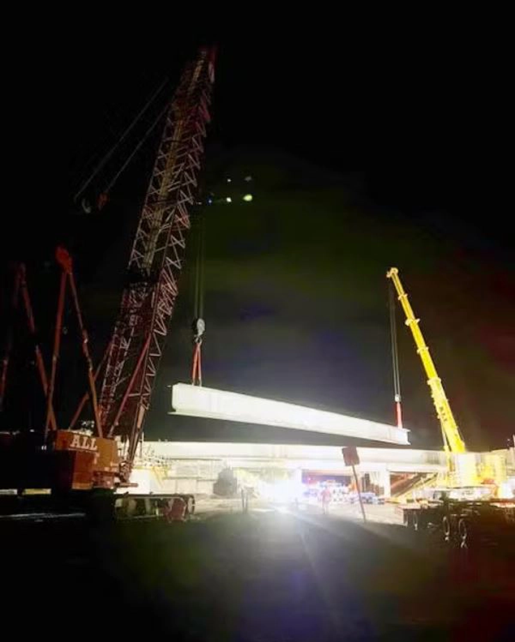
Improvements to Florida’s Turnpike continue with a series of critical lifts that required meticulous planning and methodical execution. The crux of the maneuvers is something rarely seen: a crane walking while lifting one end of 213,000-pound, 175-foot long, steel bridge beam.
In seeking a heavy lift partner to accomplish the work, general contractor Lane Construction sought the knowhow of ALL Sunshine Crane Rental, a member of the ALL Family of Companies.
The task was to build a new bridge next to an existing turnpike bridge over State Route 19 in Lake County, a mostly north-south corridor through central Florida. However, the cranes needed for the job couldn’t be positioned atop the existing bridge because of Mechanically Stabilized Earth (MSE) retaining walls already constructed at the soon-to-be new bridge’s base.
The walls are composite structures consisting of alternating layers of compacted backfill and soil reinforcement elements, fixed to a wall facing. The original plan called for assembling two cranes on the existing bridge, setting each beam on the new supports, and swinging them into place one at a time.
However, no crane can be set on the turnpike within 20 feet of the already-constructed MSE wall. With only 30 feet from the wall to the edge of the road, there was simply no room to set up a crane and still be within the 20-foot limit.
So, the cranes had to move below and assemble on SR 19. Chris Campbell, EHS manager for ALL Sunshine Crane Rental, says they specified: an all-terrain (AT) crane, a Liebherr LTM 1350-6.1; and a lattice boom crawler, a Manitowoc 2250. The crawler, with its 300-ton capacity, was tabbed as the walking crane.
“We needed a crane with a long, strong boom, and one that could stay within the called-for 40-foot radius and under 75% capacity while walking for these critical lifts,” said Campbell.
In took two nights for the cranes to set five bridge beams, which speaks to the careful execution of each lift. “The farthest the 2250 had to walk was approximately 100 feet,” said Campbell. “And it took roughly an hour for the crane to travel that distance.”
The Manitowoc was configured with 130 feet of main boom and 169,200 pounds of counterweight. The Liebherr LTM 1350-6.1 had 115 feet of boom, 100% outriggers, and 308,700 pounds of main boom.
Beams were delivered on State Route 19, with each crane set up on opposite berms of the roadway. The Liebherr was set on 8-foot by 8-foot metal outrigger pads. Once both were rigged to their ends of the beams, operators lifted in tandem and the Manitowoc operator began his walk while the Liebherr operator held its end and slowly swung to the right.
“Safety planning began weeks in advance,” said Campbell. “It started with a survey of the equipment in our yard to select the perfect machines. Next, we assigned our skilled operators, each CCO-certified by the National Commission for the Certification of Crane Operators, and each with years of experience and training on their cranes. The operators were in constant communication with each other during the lifts, executing slow, controlled movements.”
State Route 19 was completely shut down in both directions both nights, with traffic diverted via detour.

